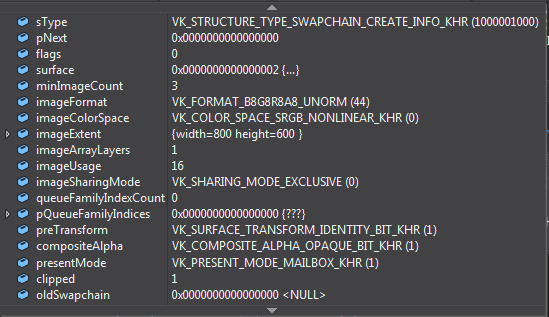I'm trying to learn Vulkan by following the great tutorials from vulkan-tutorial.com but I'm having some trouble at the point where I must create the swap chain. As stated in the title, the vkCreateSwapchainKHR creates the following error: Access violation executing location 0x0000000000000000.
The tutorial suggest this might be a conflict with the steam overlay. This is not the case for me as copying the whole code from the tutorial works.
I'm trying to figure out what went wrong with my code and to learn how to debug such issues as I will not have a reference code in the future. The incriminated line looks this:
if (vkCreateSwapchainKHR(device, &swapChainCreateInfo, nullptr, &swapChain) != VK_SUCCESS) {
throw std::runtime_error("Could not create swap chain");
}
I setup a breakpoint at this line to compare the values of the arguments in my code with the values from the reference code. As far as I can tell, there is no difference. (The adresses of course are different)
Where should I look for a problem in my code? The variable swapChain is a NULL as expected. A wrongly formed swapChainCreateInfo should not make vkCreateSwapchainKHR crash. It would merely make it return something that is not VK_SUCCESS. And device was created without problem:
if (vkCreateDevice(physicalDevice, &createInfo, nullptr, &device) != VK_SUCCESS) {
throw std::runtime_error("Failed to create logical device");
}
EDIT - I am using the validation layer VK_LAYER_LUNARG_standard_validation and my createInfo setup is the following.
// Useful functions and structures
VkPhysicalDevice physicalDevice;
VkSurfaceKHR surface;
VkSwapchainKHR swapChain;
struct QueueFamilyIndices {
std::optional<uint32_t> graphicsFamily;
std::optional<uint32_t> presentationFamily;
bool isComplete() {
return graphicsFamily.has_value() && presentationFamily.has_value();
}
};
struct SwapChainSupportDetails {
VkSurfaceCapabilitiesKHR surfaceCapabilities;
std::vector<VkSurfaceFormatKHR> formats;
std::vector<VkPresentModeKHR> presentModes;
};
SwapChainSupportDetails querySwapChainSupport(VkPhysicalDevice physicalDevice) {
SwapChainSupportDetails swapChainSupportDetails;
vkGetPhysicalDeviceSurfaceCapabilitiesKHR(physicalDevice, surface, &swapChainSupportDetails.surfaceCapabilities);
uint32_t formatCount = 0;
vkGetPhysicalDeviceSurfaceFormatsKHR(physicalDevice, surface, &formatCount, nullptr);
if (formatCount != 0) {
swapChainSupportDetails.formats.resize(formatCount);
vkGetPhysicalDeviceSurfaceFormatsKHR(physicalDevice, surface, &formatCount, swapChainSupportDetails.formats.data());
}
uint32_t presentModeCount = 0;
vkGetPhysicalDeviceSurfacePresentModesKHR(physicalDevice, surface, &presentModeCount, nullptr);
if (presentModeCount != 0) {
swapChainSupportDetails.presentModes.resize(presentModeCount);
vkGetPhysicalDeviceSurfacePresentModesKHR(physicalDevice, surface, &presentModeCount, swapChainSupportDetails.presentModes.data());
}
return swapChainSupportDetails;
}
VkSurfaceFormatKHR chooseSwapChainSurfaceFormat(const std::vector<VkSurfaceFormatKHR> & availableFormats) {
if (availableFormats.size() == 1 && availableFormats[0].format == VK_FORMAT_UNDEFINED) {
return { VK_FORMAT_B8G8R8A8_UNORM, VK_COLOR_SPACE_SRGB_NONLINEAR_KHR };
}
for (const auto & availableFormat : availableFormats) {
if (availableFormat.format == VK_FORMAT_B8G8R8A8_UNORM && availableFormat.colorSpace == VK_COLOR_SPACE_SRGB_NONLINEAR_KHR) {
return availableFormat;
}
}
return availableFormats[0];
}
VkPresentModeKHR chooseSwapChainPresentMode(const std::vector<VkPresentModeKHR> & availablePresentModes) {
VkPresentModeKHR bestMode = VK_PRESENT_MODE_FIFO_KHR;
for (const auto & availablePresentMode : availablePresentModes) {
if (availablePresentMode == VK_PRESENT_MODE_MAILBOX_KHR) {
return availablePresentMode;
}
else if (availablePresentMode == VK_PRESENT_MODE_IMMEDIATE_KHR) {
bestMode = availablePresentMode;
}
}
return bestMode;
}
VkExtent2D chooseSwapChainExtent2D(const VkSurfaceCapabilitiesKHR & surfaceCapabilities) {
if (surfaceCapabilities.currentExtent.width != std::numeric_limits<uint32_t>::max()) {
return surfaceCapabilities.currentExtent;
}
else {
VkExtent2D actualExtent = { WIDTH, HEIGHT };
actualExtent.width = std::max(std::min(surfaceCapabilities.maxImageExtent.width, actualExtent.width), surfaceCapabilities.minImageExtent.width);
actualExtent.height = std::max(std::min(surfaceCapabilities.maxImageExtent.height, actualExtent.height), surfaceCapabilities.minImageExtent.height);
return actualExtent;
}
}
// Swap Chain creation code
SwapChainSupportDetails swapChainSupportDetails = querySwapChainSupport(physicalDevice);
VkSurfaceFormatKHR surfaceFormat = chooseSwapChainSurfaceFormat(swapChainSupportDetails.formats);
VkPresentModeKHR presentMode = chooseSwapChainPresentMode(swapChainSupportDetails.presentModes);
VkExtent2D extent = chooseSwapChainExtent2D(swapChainSupportDetails.surfaceCapabilities);
uint32_t imageCount = swapChainSupportDetails.surfaceCapabilities.minImageCount + 1;
if (swapChainSupportDetails.surfaceCapabilities.maxImageCount > 0 && imageCount > swapChainSupportDetails.surfaceCapabilities.maxImageCount) {
imageCount = swapChainSupportDetails.surfaceCapabilities.minImageCount;
}
VkSwapchainCreateInfoKHR swapChainCreateInfo = {};
swapChainCreateInfo.sType = VK_STRUCTURE_TYPE_SWAPCHAIN_CREATE_INFO_KHR;
swapChainCreateInfo.surface = surface;
swapChainCreateInfo.minImageCount = imageCount;
swapChainCreateInfo.imageFormat = surfaceFormat.format;
swapChainCreateInfo.imageColorSpace = surfaceFormat.colorSpace;
swapChainCreateInfo.imageExtent = extent;
swapChainCreateInfo.imageArrayLayers = 1;
swapChainCreateInfo.imageUsage = VK_IMAGE_USAGE_COLOR_ATTACHMENT_BIT;
QueueFamilyIndices familyIndices = findQueueFamilies(physicalDevice);
uint32_t queueFamilyIndices[] = { familyIndices.graphicsFamily.value(), familyIndices.presentationFamily.value() };
if (familyIndices.graphicsFamily != familyIndices.presentationFamily) {
swapChainCreateInfo.imageSharingMode = VK_SHARING_MODE_CONCURRENT;
swapChainCreateInfo.queueFamilyIndexCount = 2;
swapChainCreateInfo.pQueueFamilyIndices = queueFamilyIndices;
}
else {
swapChainCreateInfo.imageSharingMode = VK_SHARING_MODE_EXCLUSIVE;
swapChainCreateInfo.queueFamilyIndexCount = 0;
swapChainCreateInfo.pQueueFamilyIndices = nullptr;
}
swapChainCreateInfo.preTransform = swapChainSupportDetails.surfaceCapabilities.currentTransform;
swapChainCreateInfo.compositeAlpha = VK_COMPOSITE_ALPHA_OPAQUE_BIT_KHR;
swapChainCreateInfo.presentMode = presentMode;
swapChainCreateInfo.clipped = VK_TRUE;
swapChainCreateInfo.oldSwapchain = VK_NULL_HANDLE;
if (vkCreateSwapchainKHR(device, &swapChainCreateInfo, nullptr, &swapChain) != VK_SUCCESS) {
throw std::runtime_error("Could not create swap chain");
}


vkCreateSwapchainKHRfunction-pointer was successfully loaded by your loader and notnullptr? – Bracingnullptr. Thanks for the answer! – CicciaswapChainCreateInfo! I am using theVK_LAYER_LUNARG_standard_validationvalidation layer but I'm not sure I understand how it operates yet. Also, I updated the post with myVkSwapchainCreateInfosetup. Let me know if you need more and thank you :) – Ciccia